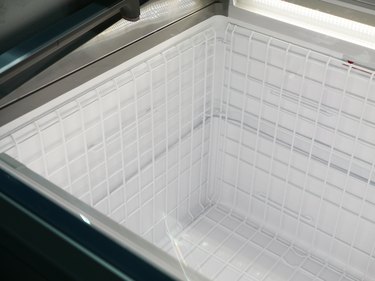
A deep freezer hot on outside, or a fridge freezer heating up on the outside, may be part of perfectly normal operation. When a chest freezer, or any other kind of freezer for that matter, overheats, the problem can often be traced to the compressor. But the compressor doesn't work all alone.
Other mechanical issues can occur in the cooling process, perhaps involving the condenser or refrigerant, which contribute to the eventual failure of the compressor. Whether internal or external, a problem that causes the compressor to work harder than it should for an extended length of time will result in an overheated chest freezer and eventual mechanical failure.
Video of the Day
Video of the Day
Freezer Condenser Generates Heat
To function properly, a compressor must get rid of the heat it pulls from inside the product compartment that it generates while going about its duty of squeezing refrigerant. The condenser is the part that dissipates heat; to accomplish this, it must be cleaned regularly of dirt buildup. As a condenser gets cluttered with dirt, the compressor must work harder to try to get rid of heat generated by the cooling process.
The condenser on both chest and upright freezers is actually encased in the outer walls of the appliance's case. This location allows the condenser to operate on humid days without "sweating" or condensing water on the outside of the walls. But it's also because of this placement that a freezer may feel warm to the touch, conveying a false positive belief that the freezer is overheating.
To help mitigate the heat by increasing air circulation, freezers should be placed where they have at least 3 inches of space on all sides. This means not placing an appliance directly against a wall or other structure.
Freezer Compressor Hot to Touch
A compressor forced to work too hard for too long will eventually simply lock up and become nonfunctional. During this period of overwork, excessive heat is generated, resulting in an overheated chest freezer. The primary job of the compressor is to squeeze refrigerant hard enough to change it from a gas to a liquid state. This state change results in lower temperatures, which cools the air that is forced into the freezer compartment.
Freezer Refrigerant Leaks
Most chest-type freezers with a compressor run on refrigerant. As the workhorse of the cooling process, compressors have been known to develop refrigerant leaks. Since the source of a leak is sometimes difficult to locate, technicians are occasionally tempted to simply put in more refrigerant and call it good.
Years may pass before a compressor actually fails. The problem with this strategy is that the leak is still there and, as refrigerant is released, a greater burden is placed on the compressor.
Warm Freezer Considerations
Not uncommonly, a chest freezer will feel somewhat warm to the touch, which is a natural byproduct of the mechanical process that cools the food inside. However, if you detect a hot odor or the sides or top of a unit become inordinately hot, your compressor is likely headed for failure. Better to deal with the problem preemptively rather than ignore it and hope for the best. A rotting freezer full of food can be nasty and expensive.